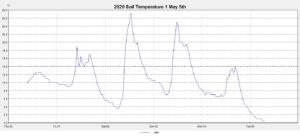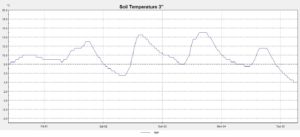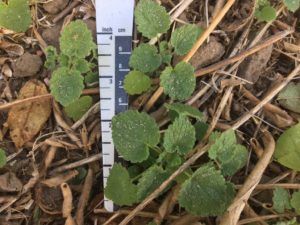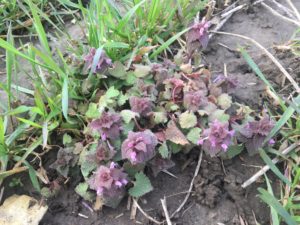The warm weather in the last week resulted in lots of corn and some soybean planting in the region, though wet soils on heavier ground has not been touched yet, especially in the Norfolk to Niagara region. Planting progress and conditions are much better than 2019. Some March planted sugar beet and carrot fields had to be replanted. Winter canola fields are looking great this year, with little winter kill but cold temperatures of -2C or lower this week could increase risk of injury if crop is approaching or at the bolting stage.
Cereals
The winter wheat crop looks great with the most advanced fields in the province at GS 32. Most of the nitrogen applications have been done, except in the Haldimand/Norfolk to Niagara area.
Many are very concerned about potential crop injury from tank-mixing plant growth regulators with herbicides or fungicides in the cold temperatures forecasted this week. Tank-mixing is not recommended in cold temperatures as the combination can increase the risk of burning the wheat. Plant growth regulator application should be given the priority, given the window is closing with the current crop stages approaching GS 31 and 32. They are safe to apply at cold temperatures as low as 1C. Hold off on herbicide and fungicide applications given both weed and disease pressure is low.
Some fields have septoria in the lower canopy but in general fields are clean. No stripe rust has been found yet in Ontario. Stripe rust is present in fields in Oklahoma, Missouri and Kansas. Varieties with good resistance/tolerance in the past are starting to fail in Kansas. There is no stripe rust in Kentucky or the rest of the Great Plains pathway yet that feeds the Great Lakes region. Much higher pressures in that pathway in 2016 and 2017 lead to Ontario seeing stripe rust in early May. Inoculum level in 2020 is currently much lower than those problem years but scouting these next few weeks is very important since this is the key window when we can see problems.
Some winter wheat varieties in Chatham-Kent and Essex are turning yellow following the warm sunny days we had. Possibly physiological symptoms from rapid root growth in the warmer weather but these fields should be scouted to ensure this is not an early-sign of physiological flecking or stripe rust.
Corn
Corn planting is going well and in much better shape than 2019. Larger producers are almost finished, one third of producers are approximately 50% completed while some haven’t started. Some early planted corn is germinating already.
Some growers are considering planting shallow, however data from Chris Olbach, agronomist at Pioneer Seeds (@chrisolbach) shows that soil temperatures are much more consistent at depths of 2 and 3 inches than at 1 inch depths. Shallow planting is not recommended.


Sweet corn planted under plastic is already spiking.
Soybeans
Very few soybeans have been planted in Essex, Chatham-Kent and Lambton. Fields are relatively dry so the soybean planting window is good. Lots of fields north of London are planted. Planting soybeans in May is fine as long as the ground is fit. The exception is if a large rain event is forecasted that could result in crusting. Soil temperatures are less of a concern for soybeans once we are in May.
Weed Concerns
In general, weed pressure is low in many fields, mostly chickweed which is in full bloom. Most summer annuals are slow but perennials like sow-thistles are showing up and are tough to control.
A few aggressive patches of purple dead-nettle are showing up in some wheat fields. A limited number of trials have evaluated control of purple dead-nettle with herbicides in cereals. In the spring, the most effective herbicides are Infinity FX, Infinity and cereal herbicides that contain the active ingredient “tribenuron” (e.g. Barricade M, Boost M and Refine M). However, given that purple dead-nettle in May will be at or close to flowering, the application of these herbicides, at best, will provide suppression of top growth. It is best to control purple dead-nettle when it is at the early seedling stage in the fall. The most effective way to do this is with a pre-plant or pre-emergence application of Eragon LQ + Merge. Once the winter wheat has emerged in the fall, applications of either Infinity or Refine SG would provide the best control of this weed, with Infinity providing slightly better activity.


Agricorp Update for Essex, Chatham-Kent and Lambton counties and Simcoe region (Leon Walczak):
Winter Wheat Damage Reports as of May 5/2020
Damage Reports and Acres
Total for January 1-May 5/2020 (damage reports 347 and 20,252 acres)
Total for January 1-April 21/2020 (damage reports 206 and 14,147 acres)
Net Change – damage reports +141 and +6,105 acres
Primary Peril is winter kill and excess rainfall
Damage Reports for Sugar Beets
7 Damage Reports for a total of 703 acres. Primary peril is: Frost.
Damage Reports for Carrots
2 Damage Reports for a total of 254 acres. Perils frost and wind
Clients should continue to contact Agricorp by phone or fax to report any damage or inquiries.
All Production Insurance clients will receive a confirmation number and an Adjuster will follow up as quickly as possible and normally within 2 business days.
The Agricorp website has up to date information on all programs and any news items that are applicable to the Programs delivered .
